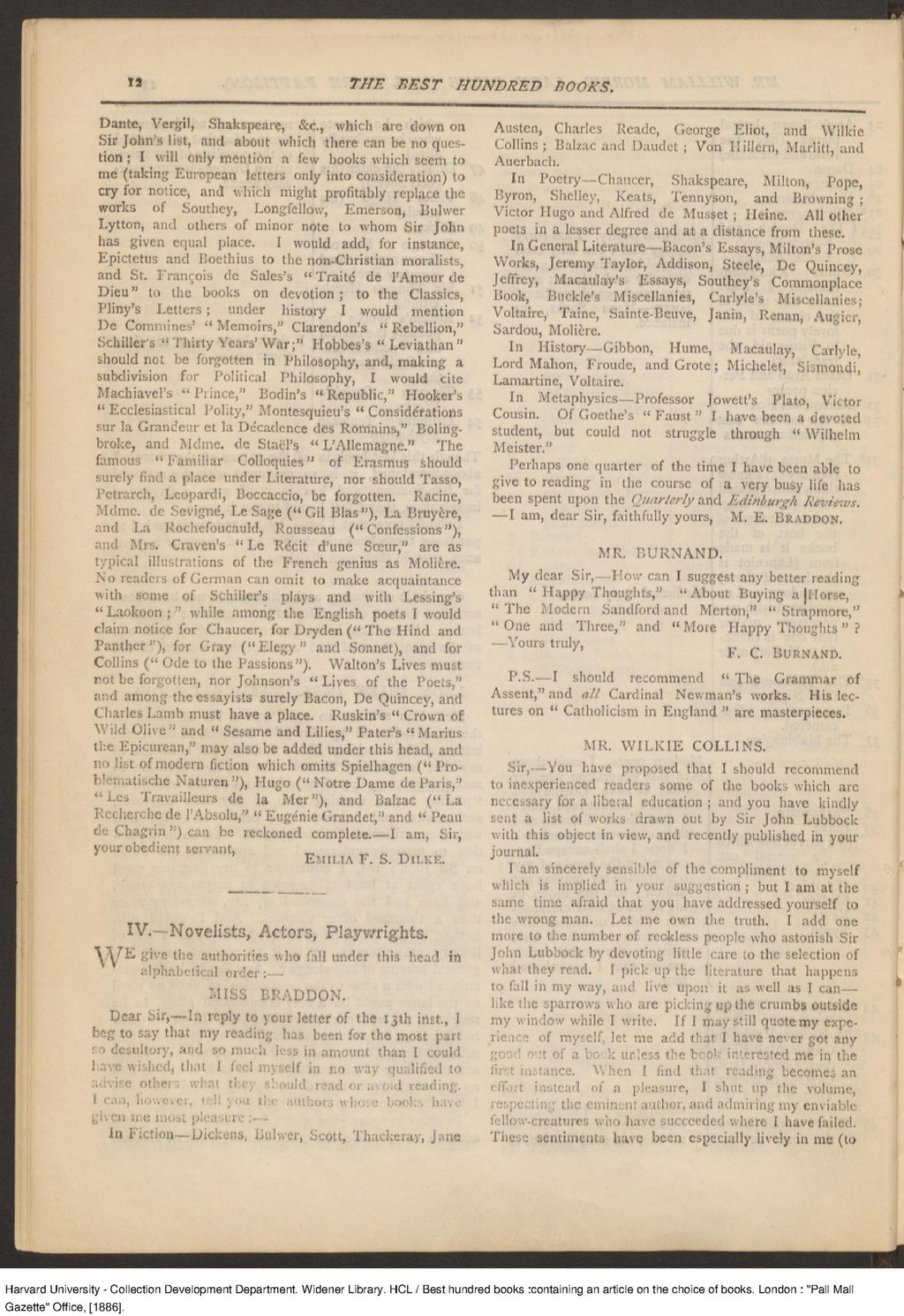Dante, Vergil, Shakspeare, &c., which are down on Sir John's list, and about which there can be no question; I will only mention a few books which seem to me (taking European letters only into consideration) to cry for notice, and which might profitably replace the works of Southey, Longfellow, Emerson, Bulwer Lytton, and others of minor note to whom Sir John has given equal place. I would add Epictetus and Boethius to the non-Christian moralists, and St. François de Sales's "Traité de l'Amour de Dieu" to the books on devotion; to the Classics, Pliny's Letters; under history I would mention De Commines' "Memoirs," Clarendon's "Rebellion," Schiller's "Thirty Years' War;" Hobbes's "Leviathan" should not be forgotten in Philosophy, and, making a subdivision for Political Philosophy, I would cite Machiavel's "Prince," Bodin's "Republic," Hooker's "Ecclesiastical Polity," Montesquieu's "Considérations sur la Grandeur et la Décadence des Romains," Bolingbroke, and Mdme. de Staël's "L'Allemagne." The famous "Familiar Colloquies" of Erasmus should surely find a place under Literature, nor should Tasso, Petrarch, Leopardi, Boccaccio, be forgotten. Racine, Mdme. de Sevigné, Le Sage ("Gil Blas"), La Bruyère, and La Rochefoucauld, Rousseau ("Confessions"), and Mrs. Craven's "Le Récit d'une Sœur," are as typical illustrations of the French genius as Molière. No readers of German can omit to make acquaintance with some of Schiller's plays and with Lessing's "Laokoon;" while among the English poets I would claim notice for Chaucer, for Dryden ("The Hind and Panther"), for Gray ("Elegy" and Sonnet), and for Collins ("Ode to the Passions"). Walton's Lives must not be forgotten, nor Johnson's "Lives of the Poets," and among the essayists surely Bacon, De Quincey, and Charles Lamb must have a place. Ruskin's "Crown of Wild Olive" and "Sesame and Lilies," Pater's "Marius the Epicurean," may also be added under this head, and no list of modern fiction which omits Spielhagen ("Problematische Naturen "), Hugo ("Notre Dame de Paris," "Les Travailleurs de la Mer"), and Balzac ("La Recherche de l'Absolu," "Eugénie Grandet," and "Peau de Chagrin") can be reckoned complete.—I am, Sir, your obedient servant,
IV.—Novelists, Actors, Playwrights.
WE give the authorities who fall under this head in alphabetical order:—
MISS BRADDON.
Dear Sir,—In reply to your letter of the 13th inst., I beg to say that my reading has been for the most part so desultory, and so much less in amount than I could have wished, that I feel myself in no way qualified to advise others what they should read or avoid reading.
I can, however, tell you the authors whose books have given me most pleasure:—
In Fiction—Dickens, Bulwer, Scott, Thackeray, Jane Austen, Charles Reade, George Eliot, and Wilkie Collins; Balzac and Daudet; Von Hillern, Marlitt, and Auerbach.
In Poetry—Chaucer, Shakspeare, Milton, Pope, Byron, Shelley, Keats, Tennyson, and Browning; Victor Hugo and Alfred de Musset; Heine. All other poets in a lesser degree and at a distance from these.
In General Literature—Bacon's Essays, Milton's Prose Works, Jeremy Taylor, Addison, Steele, De Quincey, Jeffrey, Macaulay's Essays, Southey's Commonplace Book, Buckle's Miscellanies, Carlyle's Miscellanies; Voltaire, Taine, Sainte-Beuve, Janin, Renan, Augier, Sardou, Molière.
In History—Gibbon, Hume, Macaulay, Carlyle, Lord Mahon, Froude, and Grote; Michelet, Sismondi, Lamartine, Voltaire.
In Metaphysics—Professor Jowett's Plato, Victor Cousin. Of Goethe's "Faust" I have been a devoted student, but could not struggle through "Wilhelm Meister."
Perhaps one quarter of the time I have been able to give to reading in the course of a very busy life has been spent upon the Quarterly and Edinburgh Reviews.—I am, dear Sir, faithfully yours,
MR. BURNAND.
My dear Sir,—How can I suggest any better reading than Happy Thoughts," "About Buying a Horse, "The Modern Sandford and Merton," "Strapmore," "One and Three," and "More Happy Thoughts "?—Yours truly,
P.S.—I should recommend "The Grammar of Assent," and all Cardinal Newman's works. His lectures on "Catholicism in England " are masterpieces.
MR. WILKIE COLLINS.
Sir,—You have proposed that I should recommend to inexperienced readers some of the books which are necessary for a liberal education; and you have kindly sent a list of works drawn out by Sir John Lubbock with this object in view, and recently published in your journal.
I am sincerely sensible of the compliment to myself which is implied in your suggestion; but I am at the same time afraid that you have addressed yourself to the wrong man. Let me own the truth. I add one more to the number of reckless people who astonish Sir John Lubbock by devoting little care to the selection of what they read. I pick up the literature that happens to fall in my way, and live upon it as well as I can—like the sparrows who are picking up the crumbs outside my window while I write. If I may still quote my experience of myself, let me add that I have never got any good out of a book unless the book interested me in the first instance. When I find that reading becomes an effort instead of a pleasure, I shut up the volume, respecting the eminent author, and admiring my enviable fellow-creatures who have succeeded where I have failed. These sentiments have been especially lively in me (to
